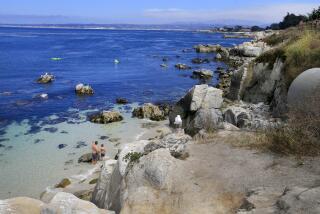U.S. Reviewing Pending Clinton-Era Safeguards for Channel Islands
- Share via
In its review of Clinton-era environmental rules, the Bush administration is reconsidering pending marine protections for the Channel Islands off Santa Barbara as well as a new coral reef reserve off the northwest Hawaiian Islands.
The proposed protections would broadly restrict commercial and recreational fishing around the Channel Islands. Similar restrictions are already in place in the Hawaiian Islands.
These “marine protected areas,” which are modeled after wilderness areas on land that protect wildlife, have come under increasingly sharp attack from the fishing industry.
Responding to protests from fishing interests, Commerce Secretary Donald Evans’ chief of staff, Laurie Fenton, was briefed earlier this week on how the process to establish the protections was launched by a Clinton executive order, rather than by legislation, and could be reversed by the new administration.
“We laid out a range of options that they had, from full-tilt ahead to full arrest,” said Margaret Davidson, acting assistant administrator of the National Ocean Service, an agency within the Commerce Department. “I’m trying to approach them as really smart businesspeople. They need to understand their options and the consequences of every decision.”
Although Davidson and other staff members recommended keeping the Clinton rules, one of the options discussed was for the federal government to pull out of ongoing negotiations to establish no-fishing zones off the northern Channel Islands.
If that were to happen, it would probably unravel 18 months of negotiations among government biologists, environmentalists and recreational and commercial fishermen to set aside 8% to 50% of the waters around the northern Channel Islands.
The intent of the protection rules is to create a safe area for declining populations of rockfish and other marine animals so their populations have a better chance to rebound.
Another option presented to Commerce Department officials is to rescind Clinton’s executive order of December that created the Northwestern Hawaiian Islands Coral Reef Ecosystem Reserve.
It is now the nation’s largest natural reserve, with 84 million underwater acres, designed to protect the endangered monk seal, rare ocean birds and coral reefs by limiting fishing and forbidding removal of coral.
Finally, the briefing raised the possibility of rescinding another Clinton executive order, issued in May, creating a framework to develop a necklace of marine protected areas along the Pacific, Atlantic and Gulf coasts.
When word of the briefing options leaked out, environmentalists blitzed the Commerce Department with faxes and e-mail arguing that only a tiny portion of the nation’s coastal waters are currently protected and that more safeguards are needed.
Warner Chabot, vice president of the Center for Marine Conservation, noted that environmentalists are alarmed by President George W. Bush’s recent decisions not to reduce carbon dioxide emissions from coal-burning plants and to relax rules on acceptable levels of arsenic in drinking water.
Officials of the National Oceanic and Atmospheric Administration said the reaction is vastly overblown. They characterized Monday’s briefing with new Bush appointees as a routine background briefing for new administrators who simply need to get up to speed on the issues.
“I understand the environmental community’s concerns, but at this time, it’s simply routine briefing,” said Roger Griffis, a NOAA policy advisor.
“It was purely information collection,” he said. “We have no indication of any changes in the works.”
Yet the Bush administration has been receiving a steady flow of criticism of marine protected areas, Davidson said. “The cards and letters campaign for the last few weeks tend to focus on the Channel Islands marine reserve,” she said.
In fact, the criticism began before Bush took office.
James V. Hansen, chairman of the House Committee on Resources, singled out the nation’s new marine protection areas in a Dec. 27 letter as examples of “overbearing rules and regulations” that he asked Bush to reconsider.
The Coastal Conservation Assn., a nationwide group of recreational fishermen, fears that the marine protected areas will close as much as 20% of coastal waters to its members.
The group announced in late November that it “is waging a legislative and legal battle to protect recreational anglers’ freedom to fish.”
(BEGIN TEXT OF INFOBOX / INFOGRAPHIC)
Proposed No-Fishing Zones
A collection of fishing, conservation and government representatives is negotiating over four possible options to establish no-fishing zones for commercial and sport fishing around the Channel Islands.
Source: Channel Islands National Marine Sanctuary
More to Read
Sign up for Essential California
The most important California stories and recommendations in your inbox every morning.
You may occasionally receive promotional content from the Los Angeles Times.













